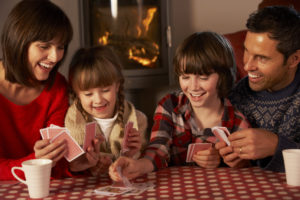Deal Them In: Using Playing Cards for Social Skills

Do you know how valuable a deck of playing cards, or my personal old school favorite, UNO, can be? Many kids struggle with various social skills including sportsmanship, joining in with peers, learning new games quickly, and being a savvy game player. Now, we can't solve all of these problems overnight, but here's a tip on how to start.
Help Your Kids Work on Social Skills with a Single Deck of Cards
You may help your children become more confident, more fun to play with, more likely to join in to play with other kids, and become a better sport. As parents, it feels great to know that your kids get asked to play at recess and for playdates, and that their social skills are growing and expanding. Even better, to accomplish all that by enjoying quality time with your kid is a win-win for everyone.
Think back to all of the card games you used to play with your friends, your parents, or your siblings when you were younger. Think about how much time you spent playing, and how much fun it was. Far away from video games, too, I'm sure. Try to remember a few games that you knew. Go Fish (for the younger kids), Crazy Eights, Slap Jack, BS, Spit, and UNO (which requires a different deck but well worth the $6 investment). If you can't remember the rules to these games, look them up. Some of the games are less sophisticated than others, so choose the ones that best suit your kids. (Go to pagat.com for card game rules.)
Maybe it's a holiday, or you're traveling some over the summer? Excellent! Luckily, a small deck of cards can fit anywhere, even in your pocket. This is a great way to occupy your bored kids at the airport, or help with transition time while staying with family. Before you leave, get yourself squared away on the directions, find the cards, and remember how to shuffle. Sit your kids down, blow their minds with your awesome shuffling skills (the bridge will wow them), and tell them you're going to teach them a card game. They'll love it. Give the directions with as few words as possible, ask them if they get it, tell them you'll help them as they learn, and get started.
Article continues below...
What's Your Parenting Style?
Take a quiz to find out what kind of a parent you are.
Deal Out the Cards
Parents, here is the first important step: Teach your children how to fan out and hold their cards properly. Kids that can't or don't hold their cards properly can't select cards to play quickly, and they end up dropping cards, and most importantly, they appear vulnerable to other kids. If other kids can easily look at their cards, they'll be taken advantage of, and we don't want that. A little skill development here – fanning and holding – will go a long way.
Next, play the game. Give them tips on how to play or what cards to play, but don't let them win. You're not doing them any favors. Remind kids who have trouble with losing that you're playing for fun, that you're having fun even if you're not winning, and ask them throughout the game if they're having a good time (before the winning or losing starts). If it starts to get too difficult for them to maintain composure, tell them you'd love to play the game later, when they're ready to play calmly and fairly. Give high fives, say "good game," congratulate the winner, and talk about playing again another time.
Help Them Become Good at the Games
Help your kids learn the games, but then, help them become good at the games. Teach them the skills required to make good card choices like quick thinking, paying attention, watching other people's moves, and any other tricks you might have up your sleeve. This may sound silly, but it will build their confidence and make them feel more comfortable. Plus, when other kids see that they're good, they'll want to play with them. They'll start asking them to play more. Most kids like a good opponent.
Once you've taught your child a card game or few, they will now feel more comfortable joining in with other kids who are playing card games, or will be more likely to accept when someone asks them to play. Kids will forever be playing card games together. A deck of playing cards and UNO cards specifically are a staple in many classrooms. They're used for indoor recess and free time. For nervous or shy kids, being comfortable, familiar, and confident with their game-playing skills will likely motivate them to play. They may even be brave enough to teach other kids some of the awesome games you've taught them.
Playing anything with your kids and actually having a good time with them increases their self-esteem, gives you fun family memories, and provides your children with countless learning opportunities to grow. Just as important, when you teach your kids games that you enjoy, your playtime with them will increase, and you will have more fun with your parenting. It's something you can do with them forever. They may not always want you to read books to them, but they may always be down for a game of cards.
Signs your child may need professional support with social skills:
- Excessive trouble with sportsmanship and losing (crying, tantrums, refusing to participate)
- Has trouble making or keeping friends
- Has trouble joining in or connecting with peers
- Struggles with conversation skills

